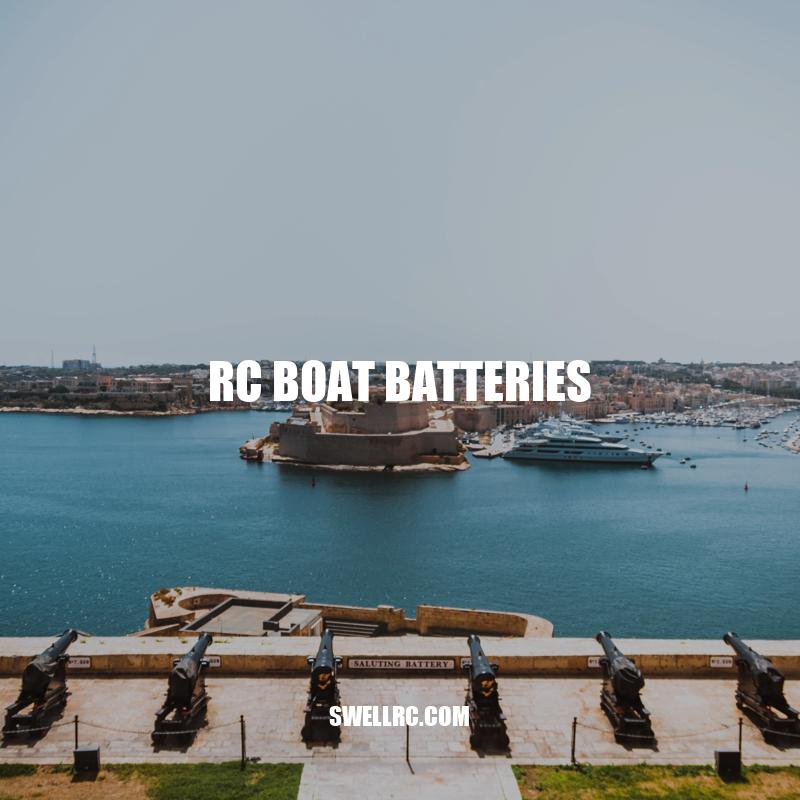Best RC Boat Batteries: Guide to Choosing and Maintaining High-Performance Batteries.
RC boats are miniature boats that are controlled remotely using a radio transmitter or mobile device. These boats have become increasingly popular among hobbyists and enthusiasts, for the thrill and excitement that they provide. Unlike other boats, RC boats require a specific type of battery that enhances the performance, speed, and runtime of the boat. Choosing the right battery is crucial, as it can affect the boat’s speed, runtime, and overall performance. Additionally, it can be quite overwhelming and confusing to select the most appropriate battery option given the variety that exists in the market. In this article, we will take a closer look at the essential features of RC boat batteries, the various types of batteries that are available, and the factors that one should consider when selecting the most suitable battery for their RC boat. We will also provide tips on how to properly maintain RC boat batteries to ensure maximum performance and longevity.
RC boat batteries come in various types and each one has its own specific characteristics, advantages, and disadvantages. Here are some of the most commonly used types of RC boat batteries:
- Nickel-cadmium (NiCad) batteries: These batteries are known for being cheap and long-lasting. However, they have a low energy density, memory effect, and high self-discharge rates.
- Nickel-metal hydride (NiMH) batteries: These are environmentally friendly and have a longer runtime compared to NiCad batteries. They also have better energy density, less memory effect, and self-discharge rates. However, they are larger and heavier than NiCad batteries.
- Lithium-ion (Li-ion) batteries: They are high-performance batteries with a lighter weight and better energy density than NiCad and NiMH batteries. These are also known for being safe and having a low self-discharge rate. However, they are more expensive than other batteries, and overcharging can be dangerous.
- Lithium-polymer (LiPo) batteries: These batteries are the most used ones for RC boats because of their high energy density and high discharge rates. They have a lighter weight, smaller size, and better runtime compared to other battery types. However, they are also the most expensive and require special charging equipment. Additionally, they are less durable than other battery types and can swell or explode if not treated properly.
When selecting the most appropriate battery for RC boats, it is important to consider the boat’s size and weight, desired speed and runtime, and budget. Online marketplaces such as Amazon and hobbyist websites like R/C Groups can be of great help to read reviews and compare product prices, warranty, and features.
What type of battery is best for boat?
Boat batteries are an essential part of powering your vessel, but with so many options available, it can be overwhelming to choose the right one. Generally, there are three types of batteries that work well for boats:
1. Flooded Lead-Acid (FLA) Batteries: These traditional batteries are the most popular and economical option. They require regular maintenance, ventilation, and checkups to ensure they are working correctly.
2. Absorbed Glass Mat (AGM) Batteries: These batteries are more expensive than FLA batteries but don’t require as much maintenance. They also have a longer lifespan and are better suited for high-performance boats.
3. Lithium-Ion (Li-ion) Batteries: These advanced batteries have a higher upfront cost, but they offer significant advantages over traditional batteries. Li-ion batteries are lightweight, long-lasting, and require no maintenance, making them an excellent choice for avid boaters.
It’s important to consider your boating needs and budget before choosing a battery. Visit websites such as West Marine or Marine Battery Guy to find the right battery solution for your boat.
| Battery Type | Pros | Cons |
|---|---|---|
| Flooded Lead-Acid (FLA) | Cheap, reliable, and widely available | Regular maintenance required, not spill-proof |
| Absorbed Glass Mat (AGM) | No maintenance required, good for high-performance boats | Expensive, less readily available |
| Lithium-Ion (Li-ion) | Lightweight, long-lasting, no maintenance required | Expensive upfront cost |
Sources:
Factors to Consider When Choosing RC Boat Batteries
Choosing the right RC boat battery can be daunting with the many options available in the market. Here are some factors to consider when making your selection:
- Capacity and Voltage Requirements: Different RC boats have varying power needs, which dictate the required battery capacity and voltage. Battery capacity is measured in milliampere-hours (mAh), and discharge rates (C) determine the amount of current delivered in seconds. Voltage requirements also need to be met. Check the boat’s specifications to determine the appropriate batteries to purchase.
- Runtime Duration and Charging Time: Depending on how long you intend to use your RC boat, the battery runtime should be factored in your choice of battery. It would help if you also considered the charging time for the battery. Different batteries have different charging times, ranging from 30 min to 5 hours.
- Brand and Price Comparison: Consider purchasing batteries from reputable brands with a long history of producing quality batteries. However, a high price does not always translate to a good product, and you should check for online reviews or consult forums to confirm the quality of a battery.
- Water Resistance Levels: RC boats are commonly used in water, and exposure to water is inevitable. Therefore, when selecting a battery, look for one with a high level of water resistance. Batteries with a high IP rating are reliable and suitable for marine use.
| Battery | Capacity (mAh) | Voltage (V) | Discharge Rate (C) | Price Range |
|---|---|---|---|---|
| NiCad | 1000-4000 | 1.2 | 10-20 | $10-$30 |
| NiMH | 1800-5000 | 6-8.4 | 10-20 | $20-$50 |
| Li-ion | 1000-5000 | 3.7 | 20-30 | $30-$70 |
| LiPo | 1300-6000 | 7.4-22.2 | 25-60 | $50-$150 |
It is recommended that you keep a close eye on the battery while charging and do not over-charge or over-discharge it, as doing so will reduce the battery’s lifespan. Additionally, when using a new battery for the first time, ensure that you follow the instructions on the package regarding charging and use cycles.
How to choose electric motor for RC boat?
When choosing an electric motor for an RC boat, there are a number of factors to consider to ensure optimal performance. These include the size and weight of the boat, as well as the type of water conditions it will be used in.
Here are some things to keep in mind when selecting an electric motor:
– Determine the appropriate size of motor based on the size and weight of your boat. Typically, you’ll want a motor with 50 watts of power for every pound of weight in the boat.
– Consider the type of water you’ll be using your boat in, as this can affect the type of motor you’ll need. For calm waters, a standard brushed motor should suffice, whereas rougher waters may require a brushless motor for better performance.
– Look for motors with high RPM and low KV (RPM/volt) ratings, as these will provide more power and speed to your boat.
– Consider the battery voltage and amperage that your motor will require. This will determine the size and type of battery you’ll need to power the motor.
When choosing an electric motor for your RC boat, it’s important to do your research and select the right motor for your particular boat and water conditions. Websites like HobbyKing and Tower Hobbies offer a range of electric motors and related products for RC boats.
Maintenance Tips for RC Boat Batteries
Proper maintenance is crucial to ensure the longevity and best performance of your RC boat battery. Here are some tips to help you maintain your batteries:
- Care and Handling: Always handle your battery with care. Avoid dropping it or exposing it to direct sunlight. Additionally, do not expose it to temperatures below freezing or above 140 degrees Fahrenheit, as extreme temperatures can damage the battery.
- Storage and Charging: When storing the battery, ensure that it is in a dry place where water cannot reach it. Batteries should never be left fully discharged, as this may cause permanent damage. Be sure to keep your battery charged according to the manufacturer’s instructions. Avoid overcharging or undercharging, as these can result in reduced battery lifespan.
- Safety and Caution: Always observe safety precautions when handling batteries. Do not attempt to puncture, crush, or disassemble the battery. Always use the charger that comes with the battery and do not use a charger that is incompatible with the battery. Use safety gear, such as gloves, eye protection, and an apron while handling the battery.
Keeping your batteries in top shape not only ensures the best performance but also saves you money in the long run by preventing the need for frequent replacements. Some companies provide specialized battery care products to help maintain the battery’s best performance. Always consult the operating manual for your RC boat battery to ensure that you follow all the guidelines provided by the manufacturer.
If you’re in need of new RC boat batteries, check out Horizon Hobby or AMain Hobbies for a great selection of high-quality batteries.
How do you charge a RC boat battery?
To charge an RC boat battery, follow these simple steps:
- Step 1: Switch off the boat and remove the battery pack from it.
- Step 2: Connect the AC battery charger to the power socket and then to the battery pack.
- Step 3: Allow the battery to charge completely. This may take several hours, depending on the battery capacity and charger output.
- Step 4: Once the battery is fully charged, disconnect it from the charger and reconnect it to the boat.
- Step 5: Turn on the boat and test it to ensure that the battery is fully charged and functioning correctly.
It’s essential to follow the manufacturer’s instructions carefully while charging an RC boat battery. Using the wrong charger or charging a battery incorrectly may damage the battery or even cause a fire hazard.
When purchasing a new RC boat battery, check the specifications to ensure that the charger you are using is compatible with it. Some batteries may require a specific type of charger, which you might need to purchase separately.
Several websites offer a wide range of RC boat batteries and chargers, such as Horizon Hobby and Amazon. It’s always best to do some research before purchasing a battery or charger to ensure that you are buying a high-quality product that matches your boat’s needs.
Conclusion
In conclusion, investing in good quality RC boat batteries is essential to unlock the full potential of your RC boat. Understanding the different types of batteries available, capacity, voltage, charging, and the factors that will affect the performance of the boat is key to making an informed decision. By taking proper care and following recommended maintenance procedures for your batteries, you can maximize the battery lifespan and maintain the boat’s optimal performance.
Additionally, it is important to ensure you are purchasing batteries from reliable sources. There are many online retailers that specialize in RC boat batteries, offering various types of batteries at competitive prices. Before purchasing, always check the product specifications and read reviews from previous customers to get the best quality battery for your RC boat.
In summary, RC boat batteries are a vital component of the boat and making an informed decision on the correct battery type and maintenance will guarantee your batteries run efficiently when you need them the most. With proper care, good quality batteries can provide you with an enthralling boat riding experience.



